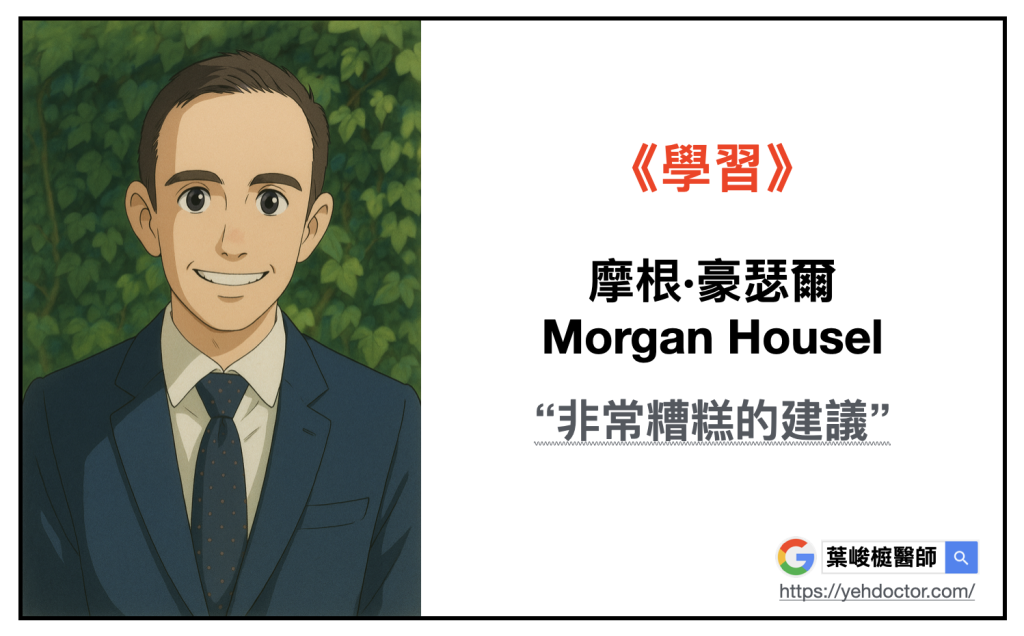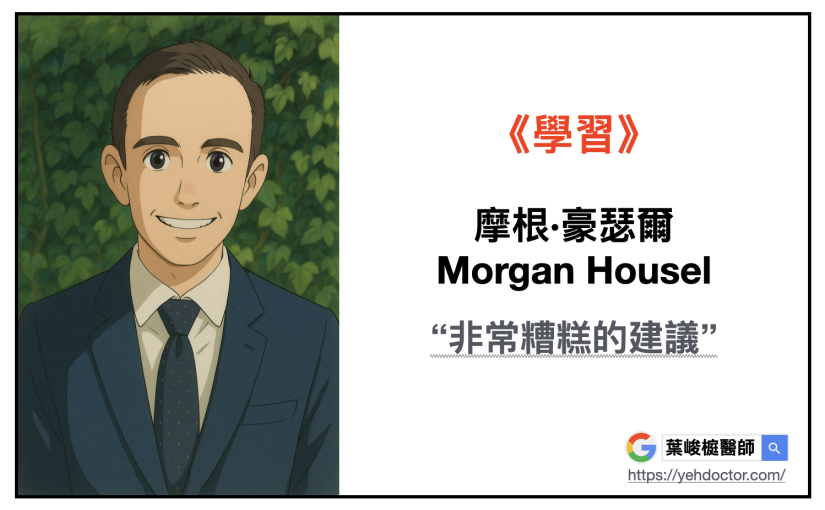《一如既往》(Same As Ever: A Guide to What Never Changes) 作者摩根·豪瑟爾 (Morgan Housel) 是著名的財經作家和投資人,對於金錢、投資和行為經濟學有獨到見解。他在2025年06月12日於 The Collaborative Fund 部落格提出了「非常糟糕的建議」。
摩根·豪瑟爾 (Morgan Housel)
摩根·豪瑟爾擅長以結合說故事能力與數據分析的方式,清晰傳達複雜的金融概念。他曾多次榮獲商業寫作獎項,包括兩次美國商業編輯和記者協會的「最佳商業獎」(Best in Business Award),以及《紐約時報》的「希尼獎」(Sidney Award)。
他的文章和見解對金融界產生了顯著影響,並被公認為行為金融領域的領先思想家之一。摩根·豪瑟爾的著作在全球範圍內廣受歡迎,其中最知名的包括:
-
- 《致富心態:關於財富、貪婪與幸福的20堂理財課》(The Psychology of Money: Timeless lessons on wealth, greed, and happiness)
- 《一如既往:不變的人性法則與致富心態》(Same As Ever: A Guide to What Never Changes)
查理·蒙格
男孩曾問查理·蒙格:「我這樣的人想在生活中取得成功的話,您有什麼建議?」蒙格回答說:「不要吸食可卡因。不要與火車賽跑。並避免所有會感染愛滋病的情況。」
Munger replied: “Don’t do cocaine. Don’t race trains to the track. And avoid all AIDS situations.”
摩根·豪瑟爾這篇部落格文提到查理·蒙格的建議:「不要與火車賽跑。」(Don’t race trains to the track.)
這句話是個比喻,只要是正常人,就不會想去跟火車比個高下,或是參與所謂的抖音致命挑戰遊戲。
「Don’t race trains to the track」的核心概念就是:不要去做那些魯莽、極度危險、幾乎註定會失敗的事情,要遠離明顯的禍患,避免自找麻煩。
簡單來說,就是「透過避免愚蠢、來保持聰明」。
非常糟糕的建議
通常很難知道什麼會帶來快樂,但卻很容易發現什麼會帶來痛苦。
摩根·豪瑟爾提到:「建造一座房子很複雜;摧毀一座房子則很簡單,我想你會在生活的許多領域發現類似的類比。當你努力前進時,反過來思考,專注於如何不倒退,會很有幫助。」
以下是一些非常糟糕的建議 (Here are a few pieces of very bad advice):
1.讓你的期望增長速度快於你的收入。 Allow your expectations to grow faster than your income.
2.在不完全了解他人生活全貌的情況下,嫉妒他們的成功。 Envy others’ success without having a full picture of their lives.
3.為了追求社會地位而犧牲獨立性。 Pursue status at the expense of independence.
4.將淨資產與自我價值聯繫起來(無論是對你自己還是對他人)。 Associate net worth with self-worth (for you and others).
5.模仿那些目標與你不同的人的策略。 Mimic the strategy of people who want something different than you do.
6.根據社群媒體的追蹤者數量來選擇信任誰。 Choose who to trust based on follower count.
7.將參與度(或活躍度)等同於洞察力。 Associate engagement with insight.
8.讓嫉妒引導你的目標。 Let envy guide your goals.
9.自動將財富等同於智慧。 Automatically associate wealth with wisdom.
10.假設新的多巴胺刺激是長期快樂的良好指標。 Assume a new dopamine hit is a good indication of long-term joy.
11.將每一次對話都視為一場要贏得的比賽。 View every conversation as a competition to win.
12.假設人們在25歲以後仍然關心你畢業於哪所學校。 Assume people care where you went to school after age 25.
13.假設你所有問題的解決方案就是更多的錢。 Assume the solution to all your problems is more money.
14.以一種不留任何犯錯餘地的方式來最大化效率。 Maximize efficiency in a way that leaves no room for error.
15.傾向於交易關係而非建立人際關係。 Be transactional vs. relationship driven.
16.優先捍衛你已經相信的事物,而不是學習新知識。 Prioritize defending what you already believe over learning something new.
17.假設人們能表達出來的,就是他們所知或所信的100%。 Assume that what people can communicate is 100% of what they know or believe.
18.相信過去是黃金時代,現在是瘋狂的,未來註定會衰落。 Believe that the past was golden, the present is crazy, and the future is destined for decline.
19.假設你所有的成功都歸因於努力工作,而你所有的失敗都歸因於運氣不好。 Assume that all your success is due to hard work and all your failure is due to bad luck.)
20.精確、確定、自信地預測。 Forecast with precision, certainty, and confidence.
21.優先考慮眼前的掌聲而非長期的聲譽。 Maximize for immediate applause over long-term reputation.
22.重視看起來很忙的表象。 Value the appearance of looking busy.
23.從不懷疑自己的群體,但對其他所有人的群體都持懷疑態度。 Never doubt your tribe but be skeptical of everyone else’s.
24.假設努力比結果更受重視。 Assume effort is rewarded more than results.
25.相信你的過往經驗是準確無誤的。 Believe that your nostalgia is accurate.
26.將自己幕後的生活與他人精心策劃的精彩片段進行比較。 Compare your behind-the-scenes life to others’ curated highlight reel.
27.輕視適應能力,假設每一個問題都會持續存在,每一個優勢都會一直保持。 Discount adaptation, assuming every problem will persist and every advantage will remain.
28.利用不確定性作為不採取行動的藉口。 Use uncertainty as an excuse for inaction.
29.在他人最糟糕的時候評判他們,卻在自己最好的時候評判自己。 Judge other people at their worst and yourself at your best.
30.假設學習在你學校畢業的那一天就完成了。 Assume learning is complete upon your last day of school.
31.將耐心視為懶惰。 View patience as laziness.
32.將金錢視為記分牌,而非工具。 Use money as a scorecard instead of a tool.
33.將忠誠(對那些值得的人)視為奴役。 View loyalty (to those who deserve it) as servitude.
34.根據你多麼渴望和需要某件事是真的,來調整你相信它的意願。 Adjust your willingness to believe something by how much you want and need it to be true.
35.過於部落化,將一切都視為社會等級的鬥爭。 Be tribal, view everything as a battle for social hierarchy.
36.對自己容易後悔的傾向毫無意識。 Have no sense of your own tendency to regret.
37.只從自己的經驗中學習。 Only learn from your own experiences.
38.與你明知道德水準低於自己的人交朋友。 Make friends with people whose morals you know are beneath your own.
總結
摩根·豪瑟爾在《非常糟糕的建議》一文中,透過查理·蒙格的智慧,闡述了「避免失敗比追求成功更有效」的反向思考哲學。
這些「糟糕的建議」包括:讓期望超越收入、盲目嫉妒他人、追求地位而非獨立、將財富與自我價值劃等號,以及過度自信、不切實際的假設等。
文章強調,了解什麼會讓你跌倒,並積極避開這些陷阱,是人生前進的重要策略。與其努力尋找快樂的奧秘,不如先確保自己沒有犯下那些會帶來痛苦的錯誤。

- LINE@ 粉專:加入好友
- 臉書粉絲團:葉峻榳醫師
- 個人部落格:葉峻榳醫師
- 醫學部落格:葉峻榳醫師診療室
- Youtube:葉峻榳醫師
- Podcast:Apple | Spotify
- 區塊鏈App:BASE
- 區塊鏈部落格:馬特市
- 三方四正:IG | Linkedin | Twitter | Pinterest | Threads | Miin | Mastodon

